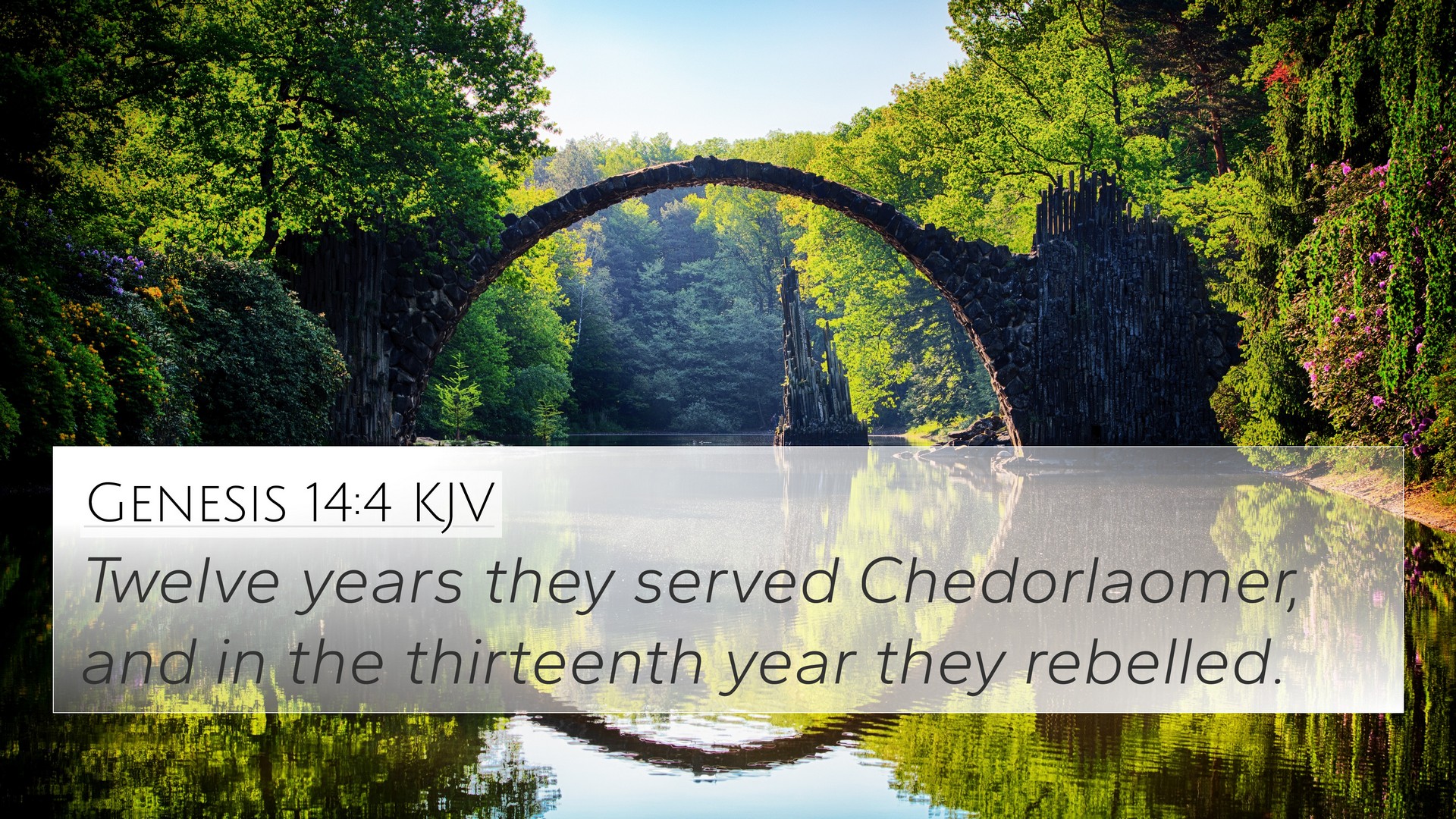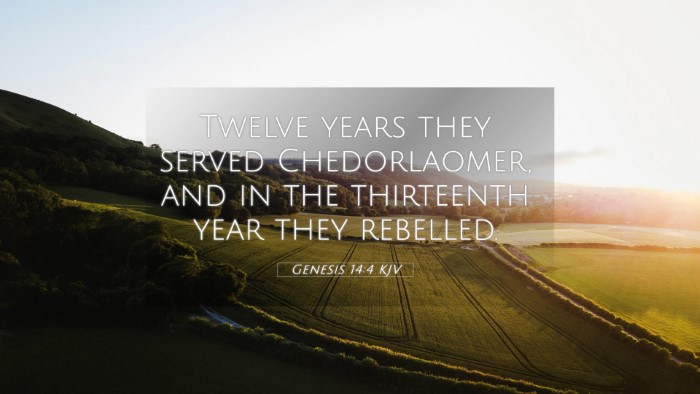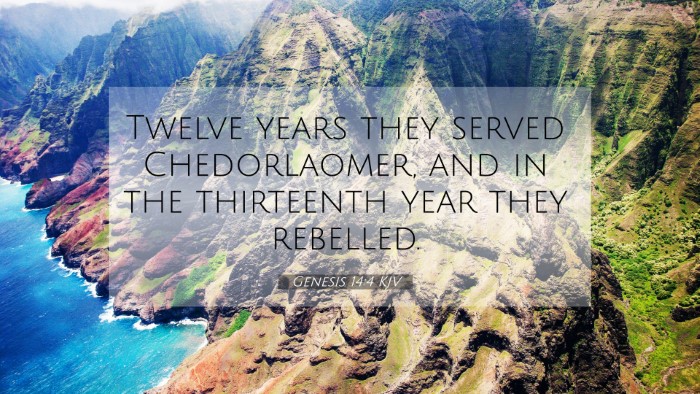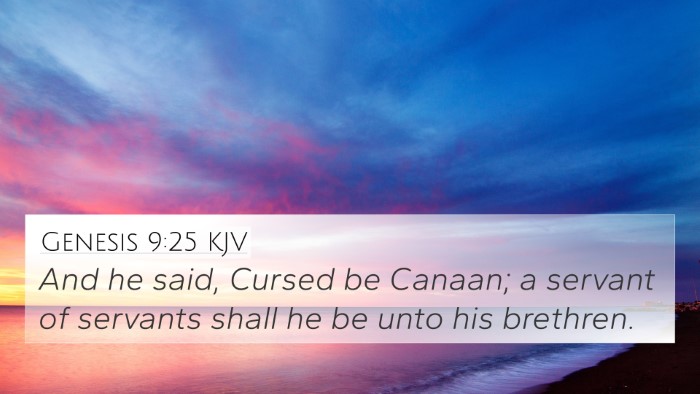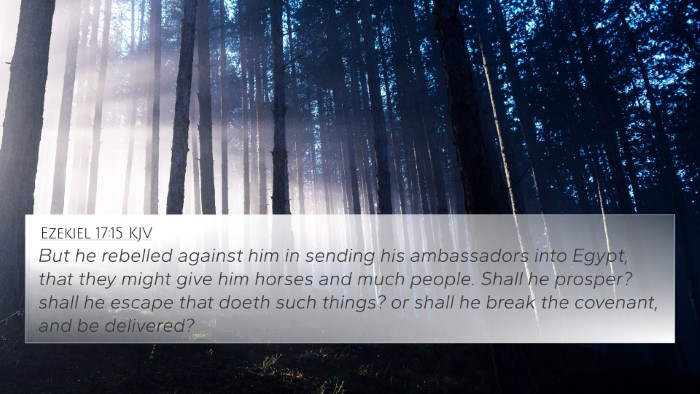Meaning and Interpretation of Genesis 14:4
Genesis 14:4 states:
"Twelve years they served Chedorlaomer, and in the thirteenth year they rebelled."
This verse captures a critical moment in the narrative of Abraham. To understand its significance, let's explore the theological insights derived from various public domain commentaries, including those of Matthew Henry, Albert Barnes, and Adam Clarke.
Summary of Insights from Commentaries
- Historical Context: Chedorlaomer was a powerful king who dominated several nations. This verse indicates that for twelve years, the subjugated kings, including the kings of Sodom and Gomorrah, paid tribute. The rebellion in the thirteenth year marks a pivotal moment, illustrating the struggle for autonomy.
- Spiritual Significance: Matthew Henry highlights that the oppression of these kings symbolizes the spiritual condition of believers under sin. Their rebellion signifies a turning back to God and an assertion of freedom from bondage.
- Divine Providence: Albert Barnes notes that the rebellion set the stage for God's deliverance. It suggests that when God's people cry out for help and turn away from oppressive influences, He is poised to intervene on their behalf.
- Theological Themes: Adam Clarke emphasizes the themes of struggle and deliverance throughout Scripture. This rebellion can be seen as a precursor to the larger biblical narrative where God delivers His people from oppression (Exodus, for example).
- Character Study: The kings' rebellion prompts reflection on leadership and authority. Chedorlaomer's reign serves as a metaphor for false authority, illustrating the need for godly leaders.
- Connections to the New Testament: The struggle for freedom depicted here foreshadows the liberation found in Christ. Just as the kings rebelled against oppression, believers are called to rebel against sin and the forces of darkness (Romans 6:14).
- Prophetic Foreshadowing: This passage sets up future conflicts, including the alliances and battles that are essential in the saga of Israel, demonstrating how God uses historical events to execute His divine plan.
- Scriptural Cross-References: Genesis 14:4 mentions several other significant biblical texts, further enriching the discourse:
- Exodus 3:7-10 - God's deliverance of Israel from oppression.
- Romans 8:21 - The creation's freedom from bondage.
- Hebrews 11:32-34 - Faith's role in overcoming oppression.
- Psalms 68:1 - A call for God to rise up against oppressors.
- Isaiah 61:1 - Proclamation of liberty to the captives.
- 2 Corinthians 3:17 - Where the Spirit of the Lord is, there is freedom.
- Galatians 5:1 - Stand firm in the freedom Christ has provided.
Thematic Connections
This verse not only marks a historical event but also opens a pathway for thematic connections throughout the Bible.
- Bondage and Liberation: Genesis 14:4 sets the tone for a recurring biblical narrative where God liberates His people from tyranny.
- Faith in the Face of Adversity: The rebellion of these kings is a testimony to the strength found in faith.
- Divine Justice: The ensuing conflict is an example of God's judgment against those who oppress.
- Inter-Biblical Dialogue: This verse invites readers to reflect on the ongoing conversation between different texts regarding freedom and authority.
Conclusion
In summary, Genesis 14:4 serves as a powerful reminder of the ongoing struggle against oppression, the need for liberation, and the constant presence of God in delivering His people. The connections established through cross-referencing highlight the depth of biblical theology and the interwoven narratives that speak to God's purpose throughout history.
Tools for Further Study
For those interested in exploring these connections further, consider utilizing various Bible reference resources, including:
- Bible concordance - A tool for locating specific verses and ideas across Scripture.
- Bible cross-reference guide - Helps in tracing thematic links and concepts.
- Cross-reference Bible study methods - Frameworks for engaging deeply with Scripture.
Final Thoughts
Understanding biblical verses, like this one from Genesis, allows for a richer engagement with the text. Employing cross-referencing techniques not only enhances comprehension but also unveils the intricate tapestry of God's redemptive narrative.
